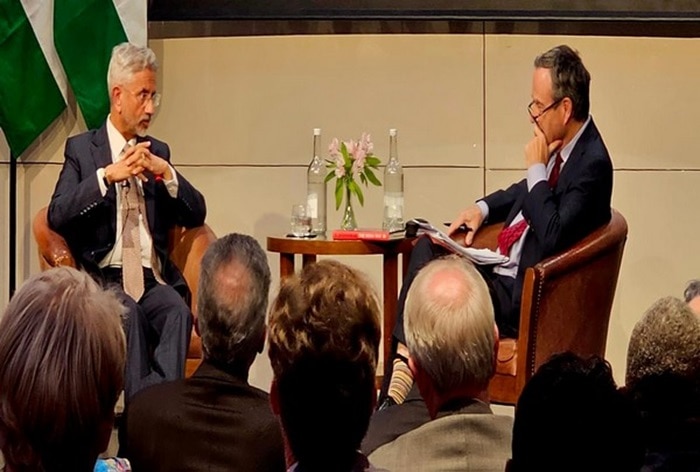External Affairs Minister (EAM) S Jaishankar requested Canadian Government to present some evidence to support Trudeau’s allegations of India’s involvement in the killing of Khalistani terrorist Hardeep Singh Nijjar.
London: The External Affairs Minister (EAM) S Jaishankar responded to Canadian Prime Minister Justin Trudeau’s allegations of India’s involvement in the killing of Khalistani terrorist Hardeep Singh Nijjar, requesting evidence to support the major claims. During a conversation with journalist Lionel Barber on Wednesday, Jaishankar emphasised the importance of credible evidence. When asked if there was any evidence of the Indian government’s involvement in the killing, the EAM categorically stated, “None.”
The EAM revealed that he has discussed the matter with his Canadian counterpart Melanie Joly, requesting the Canadian Government to share any evidence they may have. He also emphasised India’s willingness to consider a probe but highlighted that no evidence has been provided from the Canadian Government so far.
“Now, in the case of Mr Trudeau, I have discussed it also with my own counterpart. And we have told them, look, if you have a reason to make such an allegation, please share the evidence with us. We are not ruling out an investigation and looking at anything which they may have to offer. They haven’t done so,” Jaishankar said.
Jaishankar discussed the wider concern of violent and extreme political viewpoints within Canadian politics that endorse separatism from India, with some even advocating for violent methods.
“In Canada, we feel that Canadian politics has given space to violent and extreme political opinions which advocate separatism from India, including through violent means. And these people have been accommodated in Canadian politics,” the EAM said.
The EAM noted the accommodation of such views within Canadian politics, leading to attacks on Indian diplomats, including the High Commission, and intimidation of consul generals and other diplomats.
“We’ve had attacks on the High Commission, smoke bombs thrown at the High Commission. My Consul general and other diplomats were intimidated in public, on record, with no action taken by those who did know. This is a country where there is a previous history,” he added.
Amid a diplomatic row between India and Canada over the killing of Khalistani terrorist Hardeep Singh Nijjar, Indian High Commissioner to the UK, Vikram Doraiswami, was stopped by a few radicals from entering a gurdwara in Glasgow in October this year. According to a purported video posted on the Instagram channel of ‘Sikh Youth UK’ a man, reportedly a pro-Khalistani activist, was seen blocking Doraiswami from entering the Glasgow Gurdwara.
Jaishankar underscored the importance of responsible exercise of freedom of speech and expression in Canada. He articulated, “However, freedom of speech and freedom of expression also come with a certain responsibility. The misuse of these freedoms and the tolerance of such misuse for political purposes would, in our view, be highly inappropriate.”
Earlier this month, Trudeau reiterated his accusation of Indian involvement in the killing of Sikh separatist leader Nijjar on Canadian soil. He accused New Delhi of violating the Vienna Convention by expelling 40 diplomats at a time when Canada sought cooperation from global partners to investigate the murder.
Issuing a warning, the Canadian PM stated that if larger countries can “violate international law without consequences,” it will make the world “more dangerous.” Trudeau, nevertheless, expressed Canada’s desire to “work constructively” with India, emphasizing their commitment to the rule of law.
Last month, Canada withdrew 41 diplomats from India and suspended visa and consular services in Chandigarh, Mumbai, and Bengaluru consulates following the Union government’s decision to revoke their immunity. In response, the Ministry of External Affairs (MEA) asserted that no international norms were breached in India and sought parity in mutual diplomatic presence in New Delhi and Ottawa.
In September of this year, Trudeau accused “agents of the Indian government” of involvement in the killing of the Khalistani terrorist. India rejected the allegations as “absurd and motivated” and expelled a Canadian diplomat in retaliation after Ottawa asked a senior Indian diplomat to leave. New Delhi also suspended visa services to Canada but later decided to resume services for four categories after a “considered review of the security situation.” Notably, Canada has not been able to present any evidence supporting its claims regarding the killing, according to the MEA.
At the event in London, EAM Jaishankar also attended the repatriation ceremony of Yogini Chamunda and Yogini Gomukhi, the 8th-century stolen temple idols from Uttar Pradesh’s Lokhari.Meanwhile, on India-China relations, Jaishankar said,
“The rise of China is a reality but there is an equal reality that is the rise of India. The rise may be different, quantitatively or qualitatively; they may not be identical. The two (India and China) are among the oldest civilisations in the world. There are realities that need to be recognised. We are the fifth largest economy in the world and the largest in terms of population.”

